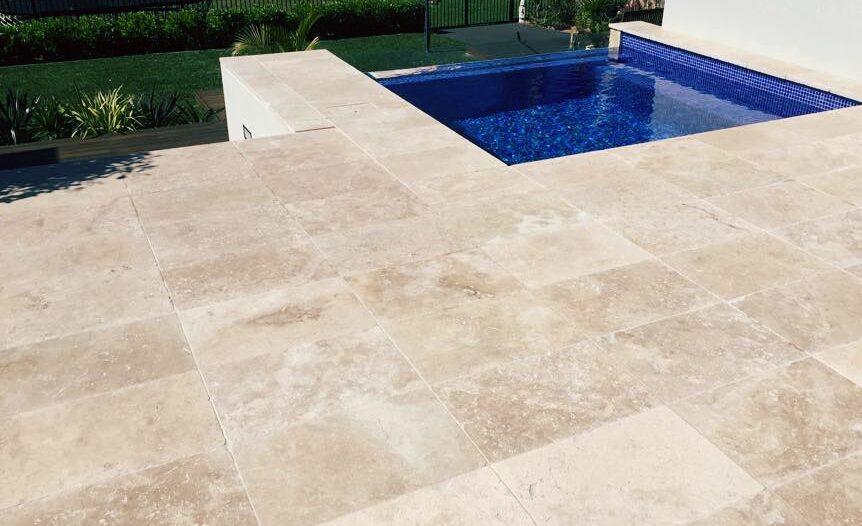Travertine pavers are a timeless choice for patios, pool decks, walkways, and driveways. Their natural beauty and durability make them a favorite among homeowners and designers. However, travertine is a porous natural stone that requires the right care. Using the wrong products can permanently damage the surface, dull the finish, or weaken the stone’s integrity. If you want your investment to last, it’s just as important to know what not to use on travertine as it is to know the right maintenance routine.
1. Harsh Acidic Cleaners
One of the biggest mistakes people make is cleaning travertine with acidic solutions like vinegar, lemon juice, or bleach. These can etch the surface, leaving dull spots and rough patches. Even some “all-purpose” or bathroom cleaners contain acids that will eat away at the stone’s natural finish.
Tip: Always stick to pH-neutral stone cleaners that are specifically designed for natural stone surfaces.
2. Abrasive Scrub Brushes or Pads
Travertine may look tough, but it scratches easily. Avoid using steel wool, wire brushes, or rough scouring pads. These can leave permanent scratches and make the stone more vulnerable to staining.
Tip: Use soft microfiber cloths or non-abrasive brushes for scrubbing.
3. Pressure Washers at High PSI
While pressure washers are commonly used outdoors, blasting travertine with too much force can cause chipping, cracking, or loosening of the pavers. High PSI settings can also erode grout and sealant.
Tip: If you do use a pressure washer, keep it at a low PSI (under 1200) and use a wide spray nozzle.
4. Harsh Chemicals and Solvents
Avoid products like ammonia, bleach, or paint removers. These chemicals not only discolor the stone but can also weaken its structural integrity. Over time, repeated use will cause the stone to lose its natural luster.
Tip: If you need to remove a tough stain, use a poultice or a stone-safe spot treatment recommended for travertine.
5. Salt and Ice-Melt Products
In colder climates, many people use rock salt or chemical ice melts on walkways. Unfortunately, these products can seep into the pores of travertine and cause pitting, flaking, and long-term damage.
Tip: Use sand or a stone-safe alternative for traction in icy conditions instead.
6. Wax or Oil-Based Polishes
It might be tempting to make travertine look shinier with waxes or oil-based products, but these can leave behind residue, attract dirt, and make the surface slippery.
Tip: If you want to enhance the stone’s look, use a penetrating sealer or enhancer made for natural stone.
Final Thoughts
Travertine pavers are a beautiful investment, but like all natural stone, they need the right care. By avoiding harsh cleaners, abrasives, and chemicals, you’ll preserve their beauty for years to come. Always choose products labeled safe for natural stone and when in doubt, test a small, hidden area before applying anything new.

